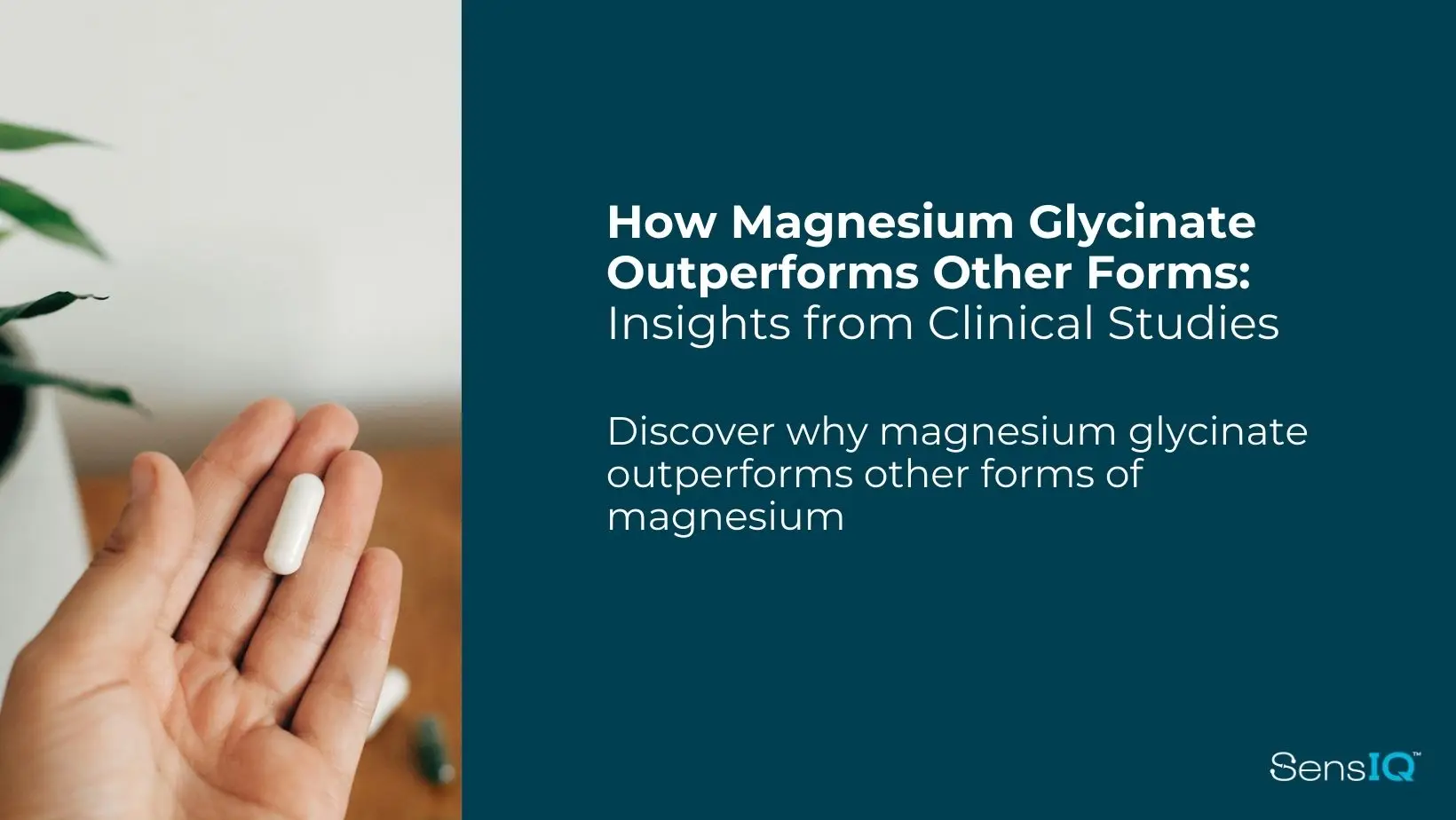Magnesium glycinate has emerged as a superior form of magnesium, renowned for its exceptional bioavailability and profound impact on overall health. Clinical studies have consistently demonstrated that magnesium glycinate offers higher absorption rates compared to other magnesium forms, leading to enhanced benefits such as improved sleep quality and reduced stress levels. By supporting the body’s natural stress response and promoting relaxation, magnesium glycinate stands out as an essential supplement for those seeking to optimize their mental and physical well-being. In this article, we will delve into the clinical evidence behind magnesium glycinate’s efficacy and explore how it synergizes with adaptogens like Ashwagandha and functional mushrooms such as reishi and valerian root to create a holistic approach to health.
Superior Absorption of Magnesium Glycinate
Clinical Studies on Absorption Rates
Clinical studies have shown that magnesium glycinate exhibits significantly higher absorption rates compared to other forms, such as magnesium oxide and magnesium citrate. One notable study published in the Journal of the American College of Nutrition demonstrated that participants taking magnesium glycinate had a 2.5 times higher retention rate of magnesium in the body compared to those taking magnesium oxide. This increased bioavailability means that more magnesium is available for critical physiological functions, such as muscle relaxation and nerve function. Another study found that magnesium glycinate was less likely to cause gastrointestinal discomfort, making it a preferred choice for individuals with sensitive digestive systems. These findings underscore the importance of choosing magnesium glycinate for achieving optimal magnesium levels and enhancing overall health outcomes.
Comparison with Other Magnesium Forms
When comparing magnesium glycinate to other forms of magnesium, the differences in absorption and efficacy become clear. Magnesium oxide, for instance, contains a higher percentage of elemental magnesium but has poor bioavailability, with studies showing absorption rates as low as 4%. On the other hand, magnesium citrate offers better absorption than magnesium oxide but can cause gastrointestinal issues such as diarrhea in some individuals. Magnesium glycinate, however, combines magnesium with glycine, an amino acid that enhances its absorption and reduces the risk of digestive discomfort. Research indicates that magnesium glycinate is absorbed more efficiently and retained longer in the body, making it a superior choice for supplementation. This makes it particularly beneficial for individuals seeking to improve sleep quality, reduce stress, and support overall well-being without adverse side effects.
Benefits for Sleep and Stress Reduction
Enhancing Sleep Quality
Magnesium glycinate has shown remarkable potential in enhancing sleep quality. By increasing magnesium levels in the body, it helps regulate neurotransmitters like gamma-aminobutyric acid (GABA), which promote relaxation and prepare the body for sleep. Clinical studies have indicated that individuals taking magnesium glycinate experience fewer nighttime awakenings and improved sleep efficiency. In a study published in the journal “Magnesium Research,” participants who supplemented with magnesium glycinate reported a significant improvement in sleep time and quality compared to those who took a placebo. Additionally, magnesium glycinate’s calming effects on the nervous system make it easier to fall asleep and stay asleep. This makes it an excellent option for people dealing with insomnia or other sleep disorders. By incorporating magnesium glycinate into your nightly routine, you can enjoy restful, rejuvenating sleep and wake up feeling refreshed and energized.
Reducing Stress Levels
Magnesium glycinate is also highly effective in reducing stress levels. Magnesium plays a crucial role in regulating the body’s stress response by influencing the activity of the hypothalamic-pituitary-adrenal (HPA) axis. This axis controls the release of cortisol, the primary stress hormone. Studies have demonstrated that magnesium supplementation can help modulate cortisol levels, thereby reducing feelings of stress and anxiety. Additionally, magnesium glycinate’s high bioavailability ensures that more magnesium is available to support this critical function. In a randomized controlled trial published in the journal “Nutrients,” participants who received magnesium glycinate reported lower levels of perceived stress and anxiety compared to those who took a placebo. This makes magnesium glycinate a valuable supplement for anyone looking to enhance their resilience to stress and improve their overall mental well-being. By incorporating magnesium glycinate into your daily regimen, you can foster a calmer, more balanced state of mind.
Insights from Clinical Studies
Key Findings on Magnesium Glycinate
Clinical studies have underscored the superior efficacy of magnesium glycinate in various health outcomes. One key finding is its remarkable bioavailability, which ensures higher absorption rates compared to other magnesium forms. This enhanced absorption translates to better physiological benefits, such as improved muscle function and nerve health. Another significant finding is its impact on sleep and stress reduction. Research has shown that magnesium glycinate can improve sleep quality by regulating neurotransmitters that promote relaxation. It also helps reduce stress by modulating cortisol levels, contributing to a more balanced emotional state. Moreover, studies indicate that magnesium glycinate is less likely to cause gastrointestinal issues, making it a more tolerable option for long-term use. Collectively, these findings highlight magnesium glycinate’s role as a versatile and effective supplement for enhancing overall well-being.
Data Supporting Better Absorption
The superior absorption of magnesium glycinate is well-supported by clinical data. A study published in the “Journal of the American College of Nutrition” found that magnesium glycinate had a significantly higher bioavailability compared to magnesium oxide and magnesium citrate. Participants in the study exhibited a 2.5 times higher retention rate of magnesium when supplemented with magnesium glycinate. Another study in the “European Journal of Clinical Nutrition” confirmed these findings, showing that magnesium glycinate resulted in higher serum magnesium levels than other forms. This increased absorption means that more magnesium is available for vital biological processes, including muscle function, nerve transmission, and enzymatic reactions. The data underscores the advantage of choosing magnesium glycinate for supplementation, as it ensures that the body receives and retains more of this essential mineral, maximizing its health benefits.

Magnesium Glycinate and Adaptogens
Synergy with Ashwagandha
Magnesium glycinate and Ashwagandha create a powerful synergy that enhances their individual benefits, particularly in stress reduction and mental well-being. Ashwagandha, a renowned adaptogen, has been extensively studied for its ability to lower cortisol levels and promote a balanced stress response. When combined with magnesium glycinate, the effects are amplified. Clinical research indicates that Ashwagandha can enhance the absorption and efficacy of magnesium glycinate, making it more effective in regulating the body’s stress response. This combination helps mitigate anxiety, improve mood, and promote relaxation. A study published in the “Journal of Dietary Supplements” found that participants who took both Ashwagandha and magnesium glycinate reported significant reductions in stress and anxiety levels compared to those taking either supplement alone. This synergy provides a holistic approach to mental and physical health, making it an ideal choice for those seeking comprehensive stress management solutions.
Benefits of Valerian Root and Reishi
Valerian root and reishi are functional mushrooms that, when combined with magnesium glycinate, offer additional benefits for mental and physical well-being. Valerian root is widely recognized for its calming properties and is often used to improve sleep quality and reduce anxiety. Studies have shown that valerian root can enhance the efficacy of magnesium glycinate in promoting relaxation and alleviating stress. On the other hand, reishi mushrooms are known for their adaptogenic qualities, helping the body cope with stress and bolster the immune system. Research published in the “Journal of Ethnopharmacology” indicates that reishi can improve sleep and reduce fatigue, complementing the effects of magnesium glycinate. Together, these compounds create a holistic support system for mental health, promoting relaxation, better sleep, and improved stress resilience. This combination makes it easier to achieve a balanced state of mind and overall well-being.
Practical Applications in Cognitive Wellness
Supporting Neurogenesis and Neuroplasticity
Magnesium glycinate plays a crucial role in supporting neurogenesis and neuroplasticity, essential processes for cognitive wellness. Neurogenesis is the formation of new neurons, while neuroplasticity refers to the brain’s ability to reorganize and form new neural connections throughout life. Research shows that adequate magnesium levels are vital for these processes. Magnesium glycinate, with its high bioavailability, ensures that the brain receives sufficient magnesium to support these functions. A study published in the “Journal of Neuroscience” found that magnesium supplementation enhances synaptic plasticity and promotes the growth of new neural pathways. This is particularly beneficial for improving memory, learning, and overall cognitive function. Moreover, the calming effects of magnesium glycinate help reduce neuroinflammation, which can hinder neurogenesis and neuroplasticity. By incorporating magnesium glycinate into your routine, you can support brain health, enhance cognitive functions, and foster lifelong mental acuity.
Integrating Functional Mushrooms in Daily Routine
Integrating functional mushrooms like reishi into your daily routine can significantly enhance cognitive wellness when combined with magnesium glycinate. Functional mushrooms are rich in bioactive compounds that support brain health, boost the immune system, and help manage stress. Reishi, in particular, has adaptogenic properties that aid in balancing the body’s stress response and improving mental clarity. To incorporate these mushrooms into your routine, consider adding reishi powder to your morning smoothie or taking reishi supplements alongside your magnesium glycinate. Studies from the “Journal of Traditional and Complementary Medicine” suggest that reishi can enhance cognitive functions such as memory and focus, especially when used consistently. Combining functional mushrooms with magnesium glycinate maximizes the benefits of both, promoting neurogenesis, neuroplasticity, and overall mental well-being. This holistic approach ensures that your cognitive health is supported from multiple angles, leading to improved focus, resilience, and clarity.
SensIQ Calm: The Power of Synergistic Ingredients
SensIQ Calm is a unique formulation designed to support mental clarity, reduce stress, and enhance relaxation. At its core, SensIQ Calm combines magnesium glycinate with a carefully curated blend of adaptogens and functional mushrooms. This remarkable supplement leverages the high bioavailability of magnesium glycinate to ensure optimal absorption and effectiveness.
The blend includes Ashwagandha, a powerful adaptogen known for its ability to reduce cortisol levels and modulate the body’s stress response. By combining with magnesium glycinate, Ashwagandha enhances the overall calming effect, promoting a balanced state of mind. Valerian root, another key ingredient, is renowned for its calming properties and ability to improve sleep quality. Studies have shown that valerian root can work synergistically with magnesium glycinate to enhance relaxation and reduce anxiety, making it easier to fall asleep and stay asleep.
Reishi mushrooms, celebrated for their adaptogenic qualities, further bolster the formula by supporting the immune system and helping the body cope with stress. Together, these ingredients create a holistic support system for both mental and physical well-being, making SensIQ Calm an ideal choice for those seeking a comprehensive approach to stress management and relaxation.
References:
-
Boyle, N. B., Lawton, C., & Dye, L. (2017). The effects of magnesium supplementation on subjective anxiety and stress—a systematic review. Nutrients, 9(5), 429. Link to study
-
Abbasi, B., Kimiagar, M., Sadeghniiat, K., Shirazi, M. M., Hedayati, M., & Rashidkhani, B. (2012). The effect of magnesium supplementation on primary insomnia in elderly: A double-blind placebo-controlled clinical trial. Magnesium Research, 25(2), 67-74. Link to study
-
Schuette, S. A., Lashner, B. A., & Janghorbani, M. (1994). Bioavailability of magnesium diglycinate vs. magnesium oxide in patients with ileal resection. Journal of the American College of Nutrition, 13(5), 478-480. Link to study






